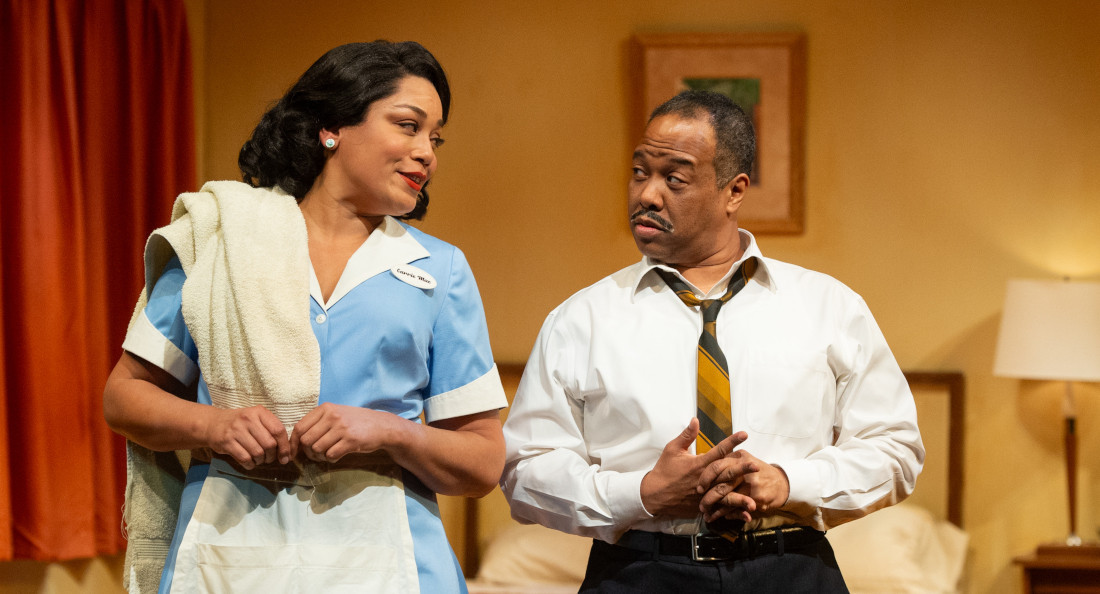Critipeg: The Mountaintop
★★★½ out of five
An overflowing crowd gathered in a raging storm on April 3, 1968 to hear Martin Luther King Jr. deliver his “I’ve Been to the Mountaintop” speech, a plea for non-violence in the Black movement at the Memphis, Tenn. sanitation workers strike.
A more modest crowd trickled into the Royal Manitoba Theatre Centre on the first Saturday evening performance of The Mountaintop, a fictional play depicting the hours between King’s final speech and subsequent assassination by James Earl Ray.
With the brilliant writing of Pulitzer Prize-winning playwright Katori Hall, smart direction of Hazel Venzon and creativity of
award-winning set designer Brian Perchaluk, the stage was set for an evening of inspiration, hope and reflection.
However, the audience’s fervor did not nearly echo that of the Memphis crowd in ’68, and to no fault of actors Ray Strachan (King) and Cherissa Richards (Camae). Their charismatic performances filled the room to the empty seats in the back and commanded more than what they got.
The play opens in Room 306 at the Lorraine Motel in Memphis. Recreated by Perchulak, the dated mid-century suite is exquisitely shabby-chic – definitely not befitting a legend, but a place King frequented regularly.
Rain pelts the windows, adding a cozy, melancholic atmosphere, charged occasionally by gun-like thunderclaps – a jumpy foreshadowing of King’s fate.
Enter King, high on post-rally adrenaline, enlivened by the storm and raring to work on his never-to-be-heard follow-up speech: “Why America May Go to Hell.”
But first – coffee!
Here we meet sultry chambermaid Camae, an uncanny temptress played to perfection by Richards. She brings the coffee and shares a Pall Mall with King, a married reverend none too eager to entertain a beautiful woman.
Camae lights up and settles in for a long evening of discourse and flirtation. Strachan’s booming sermon voice undulates as Camae challenges, rouses and soothes King, exposing his anxious, flawed and tender humanity.
As their relationship heats up, Camae is revealed to be the harbinger of King’s imminent assassination.
Acting their hearts out, the audience feels still by comparison. Jokes hang in the air. Titters murmur and die in the auditorium in the uncomfortable parts.
With an 8:30 p.m. curtain call and an intermission-less 90-minute run, maybe the patrons were sleepy, or silently mapping inconspicuous routes to the restroom.
Nevertheless, the audience was inscrutable. The play deserved an “amen!” in several places – especially in today’s climate, where King’s legacy feels so imminently important – but got none.
The final minutes are packed with so much audio-visual stimulation it almost feels misplaced.
The play concludes with the set splitting open to reveal a white pulpit, set against a glittery starlit background. King mounts the steps to deliver one final sermon.
“Can I get an amen?” King yells in conclusion. Silence. He pleads once more, but the audience fails the participation portion of the evening.
A seamless and provocative production with great writing and flawless acting, The Mountaintop deserved a bigger ovation and massive crowd. Especially during Black History Month, this play should not be missed.
Published in Volume 78, Number 19 of The Uniter (February 29, 2024)








